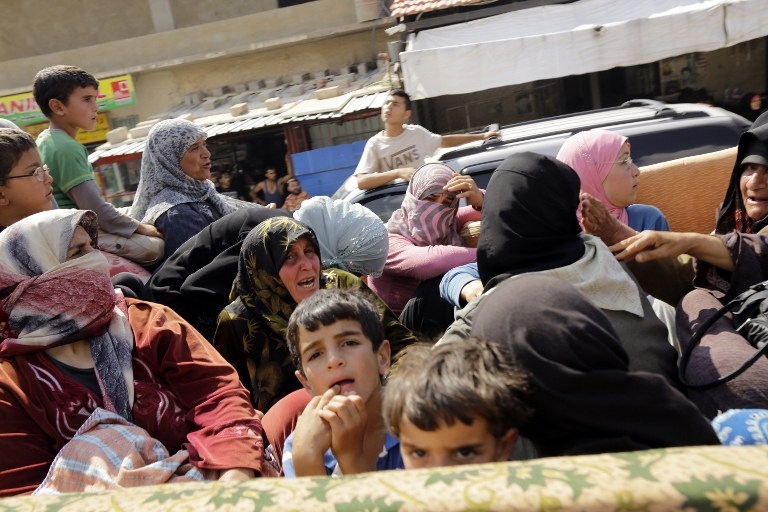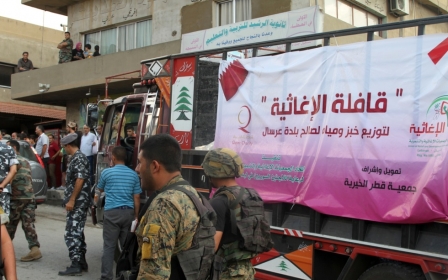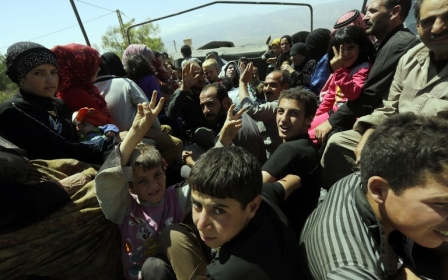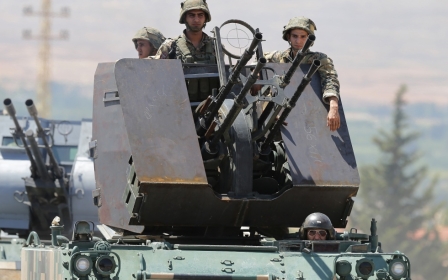Aid convoys reach Arsal amid relative ceasefire

Intermittent shelling can still be heard in the eastern Lebanese border town of Arsal, while a relative ceasefire has allowed for medical aid and food stuffs to reach locals and refugees, sources on the ground reported.
“Although the situation is much better in Arsal, shelling can still be heard. The delegation has warned the Army that if the shelling does not cease completely, the clerics will have to halt their mediation efforts,” said Kamel Kozbar, a Sayda municipality representative.
A truce, announced on Wednesday night by a delegation of Sunni clerics serving as mediators, has raised hopes of an end to the worst violence in the area since the Syrian conflict began in March 2011.
A military source said the truce appeared to be holding and the situation in Arsal was quiet.
At least 17 soldiers have been killed battling militants, who are reportedly from several different extremist groups fighting in Syria.
“The militants are from a variety of groups; they include members from al-Ahras, al-Tawhid, Nusra Front and the Islamic State (IS),” said Kozbar.
Seven soldiers who were captured by the militant groups were also released on Thursday after three others were freed the day before.
Some 20 policemen are still being held by the militants who stormed a police post in Arsal on Saturday when the clashes erupted.
One of the negotiators, cleric Samih Ezzedine, said: "All the prisoners are alive and despite difficult negotiations we have clear and positive promises they will be released. I hope that will happen on Thursday," reported AFP.
Humanitarian aid
Medical services and humanitarian convoys took advantage of the quiet to deliver aid and send in ambulances to evacuate the wounded.
"We have 44 wounded, Lebanese and Syrians, including some in serious condition, who have been taken to the east Bekaa hospital," Lebanese Red Cross director George Kettaneh told AFP.
At least three civilians have been confirmed killed in the fighting, but the toll is believed to be much higher.
“The mediators coordinated the entry of two aid convoys delivering food and medical aid to Arsal. We are awaiting another big convoy on its way to provide more food stuffs,” a representative of the Union of Relief and Development Association in Lebanon told MEE.
The United Nations High Commissioner for Refugees said earlier this week it had reports from field hospitals of at least 38 people killed and 268 wounded.
Meanwhile, 1,700 Syrian refugees left the Lebanese town on Thursday with the help of the Red Cross.
The departure appeared to be the first time a group of refugees has left Lebanon en masse to return to Syria.
“Since the situation in Lebanon is becoming like Syria, Syrian refugees feel they would rather die in their homeland especially that they are living in tents which provides them with no protection” said Kozbar.
Sectarian division
Syria's conflict, which began in March 2011, has stoked existing political and sectarian tensions in Lebanon.
Many of the country's Sunnis back the Sunni-led uprising against President Bashar al-Assad, but much of the Shiite community, including the powerful Hezbollah movement, support the Syrian regime.
The presence of the refugees in the area, and claims that some of the militants had emerged from Syrian refugee camps in Arsal has raised tensions in the region in the neighbouring town of Labweh.
Most of the Syrian refugees are Sunni Muslims, like the residents of Arsal, where they were largely welcomed, but they have been viewed with suspicion by many in the Shiite town of Labweh.
As the trucks carrying the Syrian refugees passed through Labweh, some residents swore at them and jeered, reported an AFP correspondent.
“The situation is very dangerous and we fear we are on the brink of a sectarian civil war,” Kozbar said.
“Yesterday [Wednesday] the Labweh locals closed off roads to hinder aid convoys from reaching Arsal. As a reaction, Sunni locals also closed off roads surrounding Labweh, until the military ensured the reopening of all the roads,” said Kamel.
Hezbollah has reportedly targeted Arsal’s local residents and the Syrian refugees camps during the back and forth shelling between the Lebanese Army troops and militant groups over the past few days.
“Hezbollah is putting pressure by continuing the shelling and by closing off roads with the help of the Labweh locals,” Kozbar told MEE.
The fighting has prompted widespread concern in Lebanon, with the army and politicians urging the international community to offer assistance.
Army chief General Jean Kahwaji has urged France to speed up delivery of weapons being bought for the military by Saudi Arabia under a $3-billion deal announced last year.
On Tuesday night, Lebanon's former Prime Minister Saad Hariri announced that Riyadh was pledging another $1 billion that would be available immediately for the army and security forces.
Syria war
Lebanon has sought to insulate itself from the raging war next door, but the conflict has regularly spilled over.
It currently hosts more than one million Syrian refugees, and the battle between Sunni-led rebels and Syria's President Bashar al-Assad has stoked existing political and sectarian tensions.
Many of Lebanon's Sunnis, including the residents of Arsal, sympathise with the Syrian uprising.
But Lebanese Shiites tend to back Assad's regime, and the powerful Shiite movement Hezbollah has sent its fighters across the border to bolster the embattled leader's forces.
The fighting in Arsal has caused a spike in tensions in the northern Lebanese port city of Tripoli, where gunmen from the Sunni district of Bab el-Tebbaneh often fire at security forces and their neighbours from the Alawite community, to which Assad belongs.
On Wednesday night, a homemade explosive device detonated near an army post, killing a man and wounding six people, a security source said.
New MEE newsletter: Jerusalem Dispatch
Sign up to get the latest insights and analysis on Israel-Palestine, alongside Turkey Unpacked and other MEE newsletters
Middle East Eye delivers independent and unrivalled coverage and analysis of the Middle East, North Africa and beyond. To learn more about republishing this content and the associated fees, please fill out this form. More about MEE can be found here.




